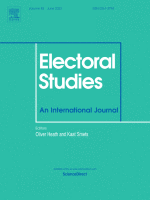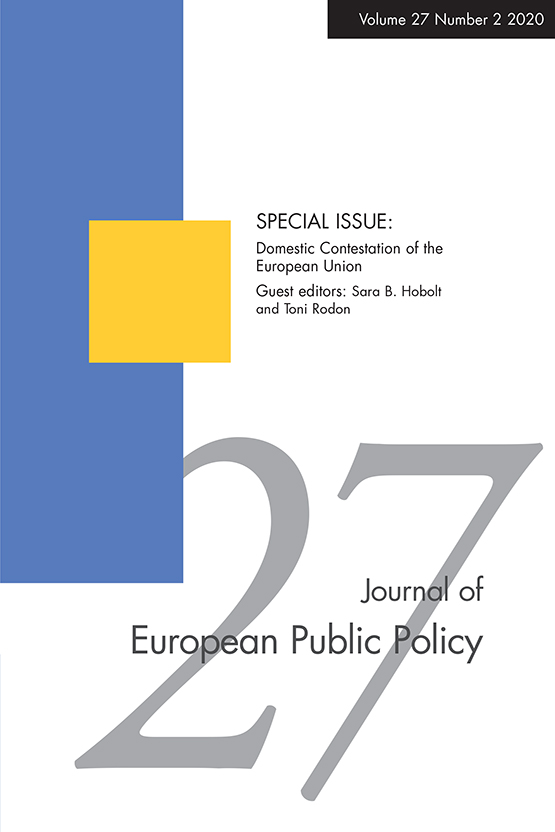COUNTERRIGHT
summary
A summary will be added in due time.
Research in this area has been (partly) funded by:


related publications
2025
-
 Taming the Far Right? Government Inclusion Strengthens Rather Than Weakens Far-Right PartiesAnnina Hermes and Heike KlüverNov 2025
Taming the Far Right? Government Inclusion Strengthens Rather Than Weakens Far-Right PartiesAnnina Hermes and Heike KlüverNov 2025Can inclusion in government break the appeal of far right parties? This question is critical given the global rise of far-right parties which makes government formation increasingly difficult. Commentators and pundits alike increasingly argue that the appeal of the far right could be broken by including far-right parties in government. The idea is that taking over government responsibility, dealing with the constraints of day-to-day politics and making policy compromises would make it difficult for far-right parties to maintain their popular appeal. We test this argument by analyzing 1,237 cabinets in 57 democracies from 1976 to 2023 by relying on a difference-in-differences design. We find no evidence that executive participation weakens far-right support. On the contrary, far-right parties gain in popularity, increasing their vote share by an average of about six percentage points in the next election. Thus, government inclusion does not break the appeal of the far right, it consolidates their electoral position.
@misc{hermes_taming_2025, title = {Taming the {Far} {Right}? {Government} {Inclusion} {Strengthens} {Rather} {Than} {Weakens} {Far}-{Right} {Parties}}, shorttitle = {Taming the {Far} {Right}?}, author = {Hermes, Annina and Klüver, Heike}, year = {2025}, month = nov, doi = {10.31235/osf.io/3mtxs_v1}, url = {https://osf.io/3mtxs_v1}, urldate = {2025-11-13}, language = {en}, }
2024
-
 How to Break Populist Parties’ Appeal? An Experimental Evaluation of Communication Counter-StrategiesHeike Klüver, Ferdinand Geissler, Felix Hartmann, Johannes Giesecke, Lukas Stoetzer, and Petra SchleiterJul 2024
How to Break Populist Parties’ Appeal? An Experimental Evaluation of Communication Counter-StrategiesHeike Klüver, Ferdinand Geissler, Felix Hartmann, Johannes Giesecke, Lukas Stoetzer, and Petra SchleiterJul 2024Right-wing populists are on the rise all over Europe. How can mainstream parties effectively counter right-wing populist parties? While prior research has predominantly studied the drivers of populist support, little is known about how to effectively counter populists. We test the effect of four communication strategies to populist rhetoric: Highlighting the role of mainstream parties in representing citizen interests, emphasizing the performance of mainstream parties, revealing the self-interest of populists and appealing to alternative identities. We test the effect of these strategies through a large-scale survey experiment that we fielded among more than 24,000 respondents in Germany by relying on real-world messages of mainstream parties identified in social media, manifestos and press releases of political parties. Overall, the results show that exposing populist parties as self-serving is an effective counter strategy for mainstream parties, particularly among voters who initially showed high support for right-wing populists
@misc{kluver_how_2024, title = {How to {Break} {Populist} {Parties}’ {Appeal}? {An} {Experimental} {Evaluation} of {Communication} {Counter}-{Strategies}}, shorttitle = {How to {Break} {Populist} {Parties}’ {Appeal}?}, author = {Klüver, Heike and Geissler, Ferdinand and Hartmann, Felix and Giesecke, Johannes and Stoetzer, Lukas and Schleiter, Petra}, year = {2024}, month = jul, publisher = {Open Science Framework}, doi = {10.31219/osf.io/h5prv}, url = {https://osf.io/h5prv}, urldate = {2025-05-09}, copyright = {https://creativecommons.org/publicdomain/zero/1.0/legalcode}, }
2023
-
 Can Wedge Strategies by Mainstream Parties Cross-Cut the Anti-Immigration Far Right Vote?Violeta I. Haas, Lukas F. Stoetzer, Petra Schleiter, and Heike KlüverElectoral Studies, Jun 2023
Can Wedge Strategies by Mainstream Parties Cross-Cut the Anti-Immigration Far Right Vote?Violeta I. Haas, Lukas F. Stoetzer, Petra Schleiter, and Heike KlüverElectoral Studies, Jun 2023Anti-immigration campaigns have helped far right parties to establish themselves in party systems around the world. We examine whether mainstream parties can employ wedge issue campaigns that divide the far right anti-immigration vote to win back electoral support. Wedge issues that cross-cut the anti-immigration vote may enhance the electoral support of mainstream parties, as long as they do not simultaneously alienate pro-immigration voters. We evaluate this expectation using a panel survey experiment conducted during the 2021 German federal election. The first wave allows us to identify wedge issues that the mainstream CDU/CSU can stress to cross-cut the anti-immigration vote. The second wave raises the salience of these issues by manipulating the perceived issue agenda of the CDU/CSU using hypothetical campaign posters. While our results show that wedge issue strategies are not effective on average, exploratory analyses reveal the potential of strategically targeted messaging in winning back support of some anti-immigration voters.
@article{haas_can_2023, title = {Can {Wedge} {Strategies} by {Mainstream} {Parties} {Cross}-{Cut} the {Anti}-{Immigration} {Far} {Right} {Vote}?}, author = {Haas, Violeta I. and Stoetzer, Lukas F. and Schleiter, Petra and Klüver, Heike}, year = {2023}, month = jun, journal = {Electoral Studies}, volume = {83}, pages = {102617}, doi = {10.1016/j.electstud.2023.102617}, issn = {02613794}, url = {https://linkinghub.elsevier.com/retrieve/pii/S0261379423000392}, urldate = {2025-06-05}, language = {en}, }
2020
-
 Responding to Far Right Challengers: Does Accommodation Pay Off?Jae-Jae Spoon and Heike KlüverJournal of European Public Policy, Feb 2020
Responding to Far Right Challengers: Does Accommodation Pay Off?Jae-Jae Spoon and Heike KlüverJournal of European Public Policy, Feb 2020Right-wing populist and far right parties are on the rise across Europe. While established parties are suffering dramatic electoral losses, right-wing parties are celebrating one electoral victory after another. To address their radical right challengers, many established parties have adopted a so-called ‘accommodative strategy’ by taking a more immigration-skeptical policy position. However, it is unclear whether such a strategy yields the expected benefits or whether such a position shift in turn hurts a party electorally. In this article, we find that mainstream left parties benefit from ‘going tough on immigration’ whereas it neither helps nor hurts mainstream right parties electorally. We arrive at this conclusion through an analysis of 16,811 vote choices in 15 elections in six countries from 1998 until 2013. Our findings have important implications for understanding what explains the rise of far right parties and the changing nature of electoral competition across Europe.
@article{spoon_responding_2020, title = {Responding to {Far} {Right} {Challengers}: {Does} {Accommodation} {Pay} {Off}?}, shorttitle = {Responding to {Far} {Right} {Challengers}}, author = {Spoon, Jae-Jae and Klüver, Heike}, year = {2020}, month = feb, journal = {Journal of European Public Policy}, volume = {27}, number = {2}, pages = {273--291}, doi = {10.1080/13501763.2019.1701530}, issn = {1350-1763, 1466-4429}, url = {https://www.tandfonline.com/doi/full/10.1080/13501763.2019.1701530}, urldate = {2025-05-15}, language = {en}, }